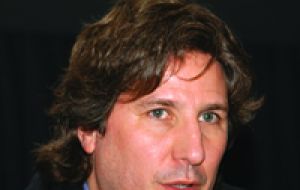MercoPress. South Atlantic News Agency
Argentina pays bond and seeks to return to global capital markets
 Minister Boudou said the 2.25 billion paid with Central Bank funds will not have an impact on the country’s international reserves.
Minister Boudou said the 2.25 billion paid with Central Bank funds will not have an impact on the country’s international reserves. Argentina paid creditors a total of 2.25 billion dollars on government-issued debt Monday, as it sought to shed the last vestiges of its 2001 default and return to the financial mainstream. Economy Minister Amado Boudou said the payment, or coupon, had been made to holders of dollar-denominated Boden 2012 bonds -- meeting a debt obligation that aims to boost confidence.
“The coupon corresponding to Boden 2012 has been paid,” said Boudou, adding that the country would now seek a return to global capital markets before the end of the year.
Argentina has been excluded from these markets since December 2001, when the country suffered an economic collapse wiping out personal savings, shredding government finances and prompting Buenos Aires to default on its debt.
In 2005 Argentina restructured its defaulted debt but there are still an estimated 20 billion dollars in holdouts plus a pending debt to the Paris Club of lenders of 6.5 billion. The country’s debt currently stands at 145 billion US dollars, plus the standing demands.
The Boden 2012 bond was issued in 2002 to compensate creditors who found access to their capital blocked during the 2001 freeze on bank withdrawals. It is estimated 65% of the bond issue is held outside Argentina and 35% locally.
Economists and private consultants saw Monday's move as ruling out the possibility that Argentina would delay debt repayments as it struggles against slumping growth and tax revenues.
Boudou defended the government's decision of using part of Argentina’s international reserves for the repayment operation arguing that “it will have a neutral impact on the Central Bank reserves.”
“The funds we paid out are dollars bought by the Argentine Central Bank with money obtained through fiscal surplus hence we are not putting the federal currency reserves under risk“. He added that the Central Bank currently has 46 billion on its reserves “which triplicate what the Central Bank used to have in 2003 before the Kirchners took power.”
In earlier comments Deputy Economy Minister Roberto Feletti said the Argentine economy would “strengthen during the first 2010 semester” and admitted “an agreement has to be found with the Paris Club and the creditors who did not accept the 2005 exchange plan, so we can enter the international credit market in 2010”.
Feletti also underlined the importance of creating a Development Bank, for which there is “consensus”, because it will help recreate long-term cost credit.
Regarding the Argentine Industrial Union's (UIA) demand of a higher dollar, Feletti explained that “with an important current account surplus, of around 6 billion dollars, it would not make any sense”. “The capital flight will stop before the end of the year,” he forecasted.




Top Comments
Disclaimer & comment rulesCommenting for this story is now closed.
If you have a Facebook account, become a fan and comment on our Facebook Page!